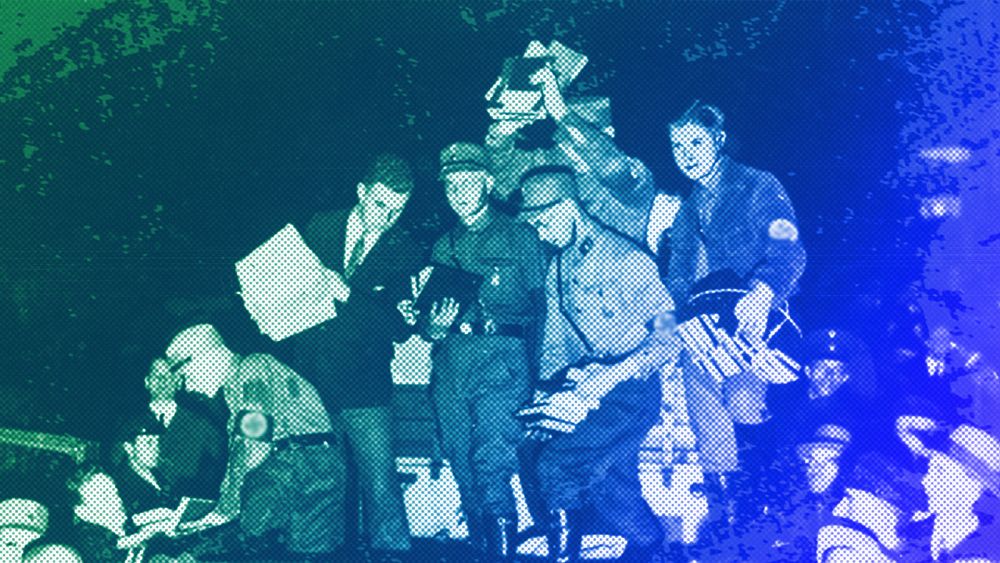Have we learned anything from the Nazi book burnings 90 years ago?

By Dr Shmuel Rosenman, Chair, March of the Living
Nearly a century after the nascent flames of the Holocaust engulfed the voices of Jewish authors, with just a phone and an internet connection, we can fight back and teach the importance of free speech and understanding, Dr Shmuel Rosenman writes.
Just last week, we marked nine decades since one of the most harrowing and highly symbolic events in the lead-up to the Holocaust.
Just a few years before the Nazis began their genocidal rampage against the Jewish people, they – and their supporters – embarked on a campaign of burning books.
Specifically, they intentionally destroyed books by Jews. Not just books with Jewish content, but any book written by Jews.
Bonfires to erase a people
On 10 May 1933, over 25,000 books were thrown into bonfires in a public, symbolic, and forceful attempt to erase Jewish culture, thoughts and ideas from German society.
In the years that followed, some 100 million books were burned under the Nazis.
Among them were volumes authored by Sigmund Freud, Thomas Mann, Lion Feuchtwanger, Bertolt Brecht, Albert Einstein, Heinrich Heine, Karl Marx, Emil Ludwig, Erich Kästner, Stefan Zweig, and many others.
The book burner in chief was, of course, Joseph Goebbels, Nazi Germany’s minister of propaganda, who declared the event “The end of Jewish intellectualism”.
The message was clear even then. The Nazi’s hatred was not of Judaism – which in itself was abhorrent enough – it was of the very existence of Jews.
It was a complete rejection of the contribution of Jews to the arts, to academia, to science.
‘Where they burn books, they will ultimately burn people, too’
The burning of books by the Nazis was not an isolated event but was part of a larger campaign to purge German society of “Jewish influence”.
Jewish professors, writers, and artists were systematically removed from their positions of influence in academia and the arts.
The books that were burned were seen as “un-German” and “corrupting,” and their destruction was a way of reinforcing the Nazi party’s message of racial purity and ideological conformity.
The event marked the beginning of a dark period of German history that would see the persecution of Jews and other minority groups, ultimately leading to the Holocaust.
As German-Jewish writer Heinrich Heine wrote in 1821, “Where they burn books, they will ultimately burn people too.”
His chilling words became a tragic reality for the six million Jews murdered during the Holocaust.
Online platforms are the new bonfires
However, Nazi Germany’s attempt to erase Jewish culture ultimately failed. The contribution to culture of these Jewish writers whose books were burned outlived the flames of Nazi hatred.
Sadly, attempts to silence Jews and deny them a voice have not been confined to the past. Of course, today, we don’t call this book burning. We call this cancelling.
In the far left, the far right and in radical Islamic circles in the US and Europe, there remains a constant theme in public discourse that denies Jewish voices an equal platform.
Some by denying Jewish rights in our historic homeland, some by denying the racist nature of antisemitism, or even denying the Holocaust itself.
This continues against a background of an ongoing rise in antisemitism and hate speech in many parts of the world.
Jewish communities are still targets of violence and discrimination, and online platforms have become a breeding ground for extremist ideologies and misinformation.
It is essential that we remain vigilant in our fight against hate speech and discrimination and work to promote a culture of inclusivity and diversity.
The online world matters, too
Each year, the International March of the Living leads thousands of people, Jews and non-Jews, young and old, to Auschwitz on Yom Hashoah, or Holocaust Remembrance Day, a solemn day of remembrance marked by Jewish communities around the world.
Together with dozens of survivors who still make the yearly trip, we march from Auschwitz to Birkenau in defiance and deference to educate and remember.
The March of the Living serves as a hopeful counterpoint to the experience of hundreds of thousands of camp inmates forced by the Nazis to cross vast expanses of European terrain under the harshest of conditions— the infamous “death marches”.
This year, we brought a new group of young leaders: online influencers and bloggers were on the March.
They helped us reach new audiences of young people. Millions of views on social media, thousands of comments, shares and “likes”.
Because in a world where books are not burned but rather cancelled online, we should all be united in speaking out against antisemitism and all forms of hatred.
A culture of inclusivity and diversity is a must
Nearly a century after the nascent flames of the Holocaust engulfed the voices of Jewish authors, with just a phone and an internet connection, we can fight back and teach the next generation the importance of free speech and understanding.
It is essential that we prioritise education and unity in our efforts to build a more tolerant and humane society.
We must promote a culture of inclusivity and diversity, where all individuals are valued and respected and where freedom of expression and intellectual diversity are celebrated.
By doing so, we can ensure that the lessons of the infamous Nazi book burnings are not forgotten and that we continue to work towards a more just and equitable world – online and in the public square, for all members of the human family.
Dr Shmuel Rosenman is the Chair of the International March of the Living, an annual two-week educational program bringing thousands from around the world to Poland, where they explore the memory of the Holocaust.
At Euronews, we believe all views matter. Contact us at view@euronews.com to send pitches or submissions and be part of the conversation.
